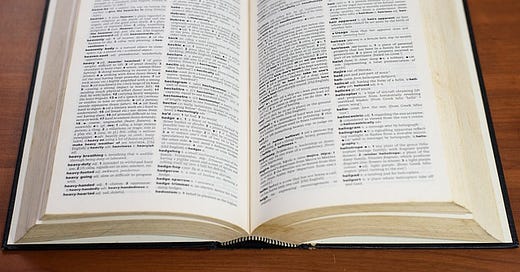“Words, words, words.”
That’s what Hamlet unforgettably says to Polonius when the old fussbudget asks what he’s reading.
Hamlet was the first Shakespeare play I saw as a kid and it was love at first sight. It was also the first one I read, even if much of the English was beyond me and I had to look words up the old-fashioned way: in a mammoth dictionary. That book was magical, offering so much to discover, some of it serendipitous, as when a neighboring word would pull my sleeve and demand attention.
Our dictionary was one of my well-read mother’s favorite books since she often looked up words to help her finish the New York Times daily and Sunday puzzles. She spoke a handful of languages before coming to America but English was the last one she learned there and she was always eager to expand her vocabulary.
I came to reading Hamlet via Charles and Mary Lamb’s Tales from Shakespeare which I found in elementary school. I was an advanced reader even then, having already plunged into science fiction with I, Robot, adventure fiction with The Three Musketeers, and memoir with Cheaper by the Dozen. I read all of those books over and over for their stories, their characters, their prose. Words I didn’t know fascinated me, and words I knew that appeared in new contexts were just as fascinating. I’d write them all down in notebooks and discover them days, months, or even years later. I was clearly teaching myself to be a writer without actually having articulated what I was doing.
My parents encouraged my reading widely, never told me that a book was too advanced for me, but my teachers weren’t always as sympathetic. At one teacher/parent conference, our 7th grade English teacher brandished a book report I’d done on The Hobbit at my mother.
“And?” my mother asked. “He loved the book and wrote it for extra credit. Is that a problem?”
“Yes! Look at this word here: ‘phantasmagorical.’ He’s too young for a word like that.”
My sarcastic mother did not object and I was grateful for that because she might have turned the teacher against me. That’s what happened in fifth grade when Mrs. Zir, a towering, grey-haired termagant who knew my parents had lived in Belgium, said something to her in French. The accent must have been atrocious because my mother actually replied with “Excuse me, what language are you speaking?”
My punishment: In the class production of The HMS Pinafore, though I already had a role, Mrs. Zir wouldn’t let me sing the character’s song.
But her pettiness didn’t stop me from adoring the word play in that operetta or in the Broadway musicals my parents listened to on their Hi-Fi or the puns I discovered in Shakespeare, some of them racy. And it didn’t stop me from dreaming in puns either, like one I had early on while taking a high school French class: a Rolls Royce drives by and someone holds up a sign with a shortened quote from the famous carpe diem poem by Ronsard: “Cueillez les roses de la vie.”
And puns are why it’s been so much fun to read Ramona Grigg’s latest substack about word usage because her fans are writing such funny and punny comments. I highly recommend you check it out below. She’s mad about words too.






Thank you for steering me toward Ramona, that was fun! We used to play what we called the"dictionary game" when I was a kid. One of us would grab the Larousse dictionary from the bookshelf, open it at random and start reading the definition. First one to guess the word, gets a point. Yes, we were cheap! No need to buy board games, lol.
I'm willing to guess a lot of writers have faced teachers who found them intimidating and did their best to thwart their growth by exuding disdain. Sad, but here we are anyway. My parents never refused me any book in their library and only later asked how I liked it. I spent wonderful days paging through books way above my age and reading level, stretching myself.